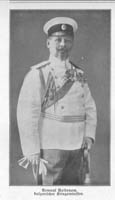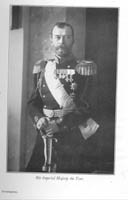Table of Contents
Key Figures
Statesmen
a | b | c | d-e | f | g | h-i | j-l | m | n-o | p | r | s | t-v | w-y
Lieutenant General Neidenoff
A Bulgarian lieutenant general and statesman, Neidenoff was the Minister of War when Bulgaria joined the Central Powers and declared war on Serbia in 1915. In December 1916, Christian Phildius met with Neidenoff and the General Staff seeking to gain access to Bulgarian prison camps. Neidenoff granted Phildius permission to inspect eight prison camps and the World's Alliance General Secretary submitted a positive report on his findings. In December 1917, the Ministry of War officially granted permission for the World's Alliance to send War Prisoners' Aid Secretaries to begin welfare operations for Allied POW's in the kingdom. Neidenoff served on the Honorary Committee of the Bulgarian Branch of the WPA which oversaw POW relief operations in the kingdom.
Tsar Nicholas II of Russia (1868-1918)
Eldest son of Tsar Alexander III, Nicholas ascended the Russian imperial throne in 1894. He worked to establish a liberal framework for the conduct of warfare through international law by calling for the International Peace Conference at The Hague in 1899, which led to the founding of the Hague Tribunal. The Hague Conference established "rules of warfare" including the treatment of prisoners of war. Nicholas promoted the construction of the Trans-Siberian Railway as the most efficient way of connecting the raw materials of Siberia with the industries of European Russia. In 1904, the Japanese launched a war against Russia by attacking Port Arthur and seizing control of Korea. After a number of humiliating defeats, the Russians agreed to a negotiated peace settlement through the offices of President Theodore Roosevelt. The Russians acknowledged Japanese rights in southern Manchuria and lost the southern half of the island of Sakhalin. Political unrest forced Nicholas to grant a constitution and call the Duma to sit, establishing Russia as a constitutional monarchy. He attempted to quell domestic discontent by supporting liberal reforms through Prime Minister Petr Stolypin. After the assassination of Archduke Franz Ferdinand of Austria-Hungary in June 1914, Nicholas supported the Serbians and fulfilled his alliance commitments with France and Britain. Russia joined the Allies and launched an invasion of East Prussia, which helped relieve German pressure on the Western Front. Austro-German forces drove east through Russian Poland and Galicia and Nicholas assumed overall command of the Russian armies. Political dissatisfaction with his domestic and foreign policies, coupled with a series of military defeats, led to the February Revolution in March 1917. Nicholas abdicated the throne and the Provisional Government placed the royal family under arrest. After the Bolsheviks seized power in the October Revolution in November 1917, the new regime took precautions to prevent Nicholas and his family from liberation by the White forces. The Bolsheviks executed the Romanovs at Ekaterinburg in July 1918.
Madame Orjewski
A Russian humanitarian, Orjewski was a leader of the Russian Sisters' Commission during World War I. She was involved in the care and treatment of prisoners of war and was strongly supported by Tsarina Alexandra and Empress Dowager Marie Feodorovna. In 1915, Orjewski conducted an extensive inspection tour of prison camps in Russia and reported on problems in the logistical system. She then conducted a tour of prison camps in Germany in an official capacity for the Russian government. Orjewski was impressed with the American YMCA's War Prisoners' Aid program and asked Conrad Hoffman to permanently take over relief distribution operations on behalf of Russian prisoners. The Russian Sisters' Commission would provide the supplies and WPA Secretaries would distribute the aid to POW's in Germany. Hoffman agreed on the condition that a reciprocal program be set up for German prisoners in Russian prison camps.

